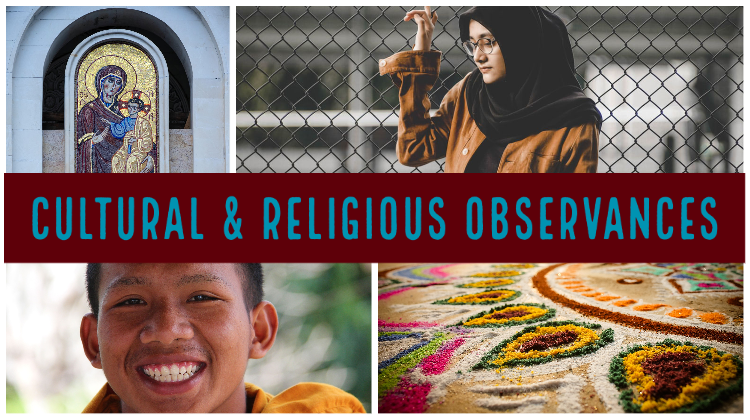Irish American Heritage Month

Culture/religion: National observance
Date: March
Irish American Heritage Month celebrates the contributions Irish Americans have made to the United States. The first celebration dates back to 1792 with the first St. Patrick’s Day parade in New York City.
In October 1990, Congress passed Public Law 101-418 establishing March 1991 as Irish American Heritage Month. Laws were passed and proclamations signed in 1992, 1993 and 1994, and have become an annual event since 1997.
Sources:
Irish-American Heritage Month, Library of Congress
National Developmental Disabilities Awareness Month

Culture/religion: National observance
Date: March
President Ronald Reagan recognized March as Developmental Disabilities Awareness Month in 1987. The purpose of this day is to raise public awareness of the needs and potential of Americans with developmental disabilities and to provide the opportunities they need to lead productive lives and achieve their full potential.
Sources:
March is Developmental Disabilities Awareness Month, National Disability Institute
Women’s History Month

Culture/religion: National Observance
Date: March
Women’s History Month began in 1981 when Congress authorized the president to proclaim the week beginning March 7, 1982 as “Women’s History Week.” Later, in 1987, after being petitioned by the National Women’s History Project, Congress passed Public Law 100-9 formally designating the month of March 1987 as Women’s History Month.
Women’s History Month commemorates and encourages the study, observance and celebration of the vital role of women in American history.
Sources:
Maha Shivaratri

Culture/religion: Hindu
Date: March 1
Maha Shivaratri is an annual celebration that falls on the new day in the Hindu month of Maagha, and is dedicated to the worship of the Hindu God, Lord Shiva.
Though there are different origin stories for the festival, it is believed to be the day Lord Shiva married Goddess Parvati. Another belief holds that Goddess Parvati pleaded with Lord Shiva to save the earth from destruction. He agreed, but only on the condition that its inhabitants worshipped him with dedication and passion.
Maha Shivaratri is one the most favored of the 12 Shivaratris observed each year. Some celebrate the festival during the day, while other celebrate at night where men and women come together and sing religious hymns.
Sources:
Maha Shivaratri 2020: History, significance, why Lord Shiva is worshipped on this day, Hindustantimes.com
Ash Wednesday

Culture/religion: Christianity
Date: March 2
Ash Wednesday marks the beginning of Lent, a period of fasting and prayer, and is always 46 days before Easter Sunday. Ash Wednesday is primarily observed by Catholics, but many other Christians observe it too.
Ash Wednesday is derived from the ancient Jewish tradition of penance and fasting, and the practice includes the wearing of ashes on the head which represent the dust from which God made us. After receiving ashes during Mass, many take the day off to remain at home as it is generally inappropriate to go out in public, for example to shop or dine.
Ash Wednesday is a season of penance, reflection and fasting which prepares one for Christ’s Resurrection on Easter Sunday.
Sources:
Ash Wednesday, Catholic.org
Lent

Culture/religion: Christianity
Date: March 2-April 14
Lent marks a 40-day period, beginning on Ash Wednesday, leading up to the celebration of Easter. Lent is observed by practices of self-denial, like fasting, meant to order their hearts and minds to the suffering of Christ during the 40 days he spent fasting in the desert.
The last week of Lent is Holy Week, starting with Palm Sunday. Depending on the Christian denomination and local custom, Lent ends either on the evening of Maundy Thursday or at sundown on Holy Saturday when the Easter Vigil is celebrated.
Sources:
Christian History: Lent, Christianity Today
Lent, Wikipedia

